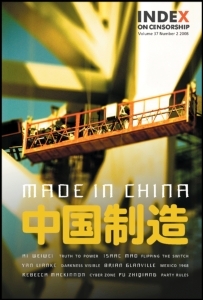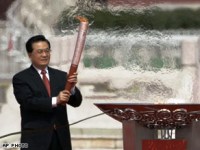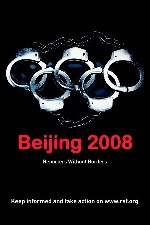14 Jul 2008 | Uncategorized
 In the lead up to the Olympic Games in China, Indexoncensorship.org will be publishing articles from our journal. This week, an interview with Ai Weiwei, the artistic genius behind Beijing’s ‘bird’s nest’ stadium.
In the lead up to the Olympic Games in China, Indexoncensorship.org will be publishing articles from our journal. This week, an interview with Ai Weiwei, the artistic genius behind Beijing’s ‘bird’s nest’ stadium.
Read Ai Weiwei interview here (pdf)
7 May 2008 | Comment
 The estimated 30,000 journalists expected to converge on Beijing for the 2008 Olympiad need to prepare themselves well in advance before they blunder across one of the world’s least understood and most volatile domestic political stages, writes Rohan Jayasekera
The estimated 30,000 journalists expected to converge on Beijing for the 2008 Olympiad need to prepare themselves well in advance before they blunder across one of the world’s least understood and most volatile domestic political stages, writes Rohan Jayasekera
The XXIX Olympiad in Beijing will be covered by an expected 20,000 accredited sports media workers — and another 10,000 unaccredited. That’s more than three journalists for every athlete. How will China react to this influx of independent opinion if the focus comes off sport and on to politics?
January 2008 rules introduced for the Games theoretically allow foreign journalists to report freely on Chinese ‘politics, economy, society, and culture’ until next October.
This promised liberalisation came to a sharp halt following the outbreak of violent protests in the Tibetan capital of Lhasa on 10 March. Beijing responded with a news blackout, expelling foreign reporters from Beijing, Tibet and its neighbouring provinces of Gansu, Qinghai, and Sichuan.
The Foreign Correspondents Club of China has recorded more than 230 abuses of the new rules. Until March things were getting better, BBC World News Editor Jon Williams told a conclave of Chinese and Western journalists and media rights activists in Paris in April. ‘Now they’re as difficult as they’ve been for a long time.’
(more…)
15 Apr 2008 | Comment
 Would an Olympic boycott really inspire China to improve its human rights record and its dealings with Tibet? Or would it make things worse, asks Nick Young
Would an Olympic boycott really inspire China to improve its human rights record and its dealings with Tibet? Or would it make things worse, asks Nick Young
Tibet’s Himalayan neighbours in Bhutan and Nepal are beginning to build political institutions better fitted to the 21st century, and there is no doubt that Beijing should renegotiate its relationship with Lhasa in keeping with this zeitgeist.
But would an Olympics boycott advance this process or, indeed, advance human rights in China generally? Almost certainly not. Humiliating the government of China is, in this instance if not always, a less astute tactic than campaigners suppose, and is likely to prove counterproductive.
China expected the Olympics to signal the end of a long era of humiliation that began 170 years ago with the Opium Wars. By 2000 it seemed that China had at last emerged from the shadows of western bullying, Japanese invasion, civil war, internecine political struggle and failed development. The political elite saw hosting the Olympics as a celebration of this renaissance. They will take efforts to spoil the Games as a sign that, rather than being ready to accommodate China’s peaceful rise, the west is determined to slap China back down the development ladder.
(more…)
10 Apr 2008 | Comment, News and features
 The increasingly farcical Olympic torch relay made its way to California yesterday. Lucie Morilllon of Reporters Without Borders was there
The increasingly farcical Olympic torch relay made its way to California yesterday. Lucie Morilllon of Reporters Without Borders was there
After the London and Paris demonstrations that disrupted the Olympics torch relay and angered Chinese officials, the world’s eyes were on San Francisco — the next city scheduled to welcome, 9 April, the symbol of the most controversial Games since Moscow 1980. A large proportion of the city’s population is Asian. The day before, exactly four months before the opening ceremony in Beijing, thousands of people attended a pro-Tibet rally and vigil with speeches by Desmond Tutu and actor Richard Gere. Other demonstrations had taken place before that event, including one involving activists who climbed the Golden Gate Bridge to display ‘Free Tibet’ flags. Protesters were warming up for the next day, as were the San Francisco police, the city’s officials, and the Beijing Olympic Committee. The route had already been shortened from eight to six miles, and was announced at the last minute in a clear attempt to prevent demonstrators from making plans well in advance. San Francisco Mayor Gavin Newsom had made sure that he would have some flexibility in addressing the issue. He said that the route could be changed at any time, depending upon how the situation evolved.
The torch relay was originally scheduled to start off at 1pm from McCovey Cove, follow the waterfront to Fisherman’s Wharf, and head back to Justin Herman Plaza. I decided to go out to keep track of the demonstrations at about 10.30am. My hotel was a couple of blocks from the Embarcadero. As soon as I left, I bumped into a group of pro-Tibet demonstrators, all carrying flags and posters. I followed them down the avenue. On our way, we encountered groups of pro-Chinese government protestors carrying huge Chinese and Bejing 2008 flags. The Chinese authorities had obviously decided to play the PR game and send their own people to counter the visibility of their opponents. The closer we got to the Justin Herman Plaza, where the closing ceremony was supposed to take place, the more the various groups of protesters began to intermingle and confront each other, sometimes resorting to verbal provocation and insults. A group of Olympic supporters came across some Tibetan monks and started yelling at them. At this stage I was worried that even a single gesture could turn the situation violent. But the Tibetan monks went on, while their followers made peace signs. The pro-Chinese protesters were playing drums to drown out the loud heckling on one side and cheers on the other.
(more…)
 In the lead up to the Olympic Games in China, Indexoncensorship.org will be publishing articles from our journal. This week, an interview with Ai Weiwei, the artistic genius behind Beijing’s ‘bird’s nest’ stadium.
In the lead up to the Olympic Games in China, Indexoncensorship.org will be publishing articles from our journal. This week, an interview with Ai Weiwei, the artistic genius behind Beijing’s ‘bird’s nest’ stadium.


